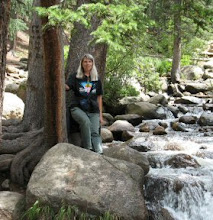What we remember about childhood, another kid in the woods tells me, is not the fun we had but the discoveries we made. We were alone, with no adults to tell us what to think about what we saw and did. We made up our own interpretations. The woods behind our house was just an old abandoned railroad right-of-way, but huge to me. We believed we could make paper or canoes from the chokecherry bark that peeled loose from the trees. A friend and I pretended we were hermits, living in the woods and rarely visiting the townsfolk. We knew where and when to find violets to pick for our moms; knew where there were bluebells in the woods at the other end of the street and knew not to pick them. They were special and rare.
Mostly I remember the creek. In those days I never knew its name and never even thought to ask whether it had one. It was "the crick." It was where the minnows were, where we'd find jewelweed pods to pop, where we'd hunt for fossils and other treasures. We'd build little temporary ponds to house the shiners and darters we caught by hand. They'd soon escape. Out behind Linda's house, a different creek was still "the crick." There we once waded knee deep trying to build a dam to stop the spring runoff—a major flood to us. Linda's creek was different, shady and mysterious and wild, not open and tamed and barren like my own at home.
The days were long; all the days I remember were summer, I guess. Each day's activity had such intense focus it left an imprint when I'd close my eyes to sleep. There they were, the biggest fattest wild strawberries peeking temptingly from under shiny green leaves. If I'd spent the day at the creek, darters and shiners and pinheads would flash by my closed eyes, luring me to catch them barehanded. That skill I managed to keep into college, much to the surprise of a classmate who challenged me. Once, memorably, I even caught a six-inch mullet with the help of a couple tin cans. I think that surprised both of us. No wonder we always came home soaking wet.
 The old apple orchard we found: a wonderland in spring. Even today, the scent of apple blossoms transports me there. Near it was a secret place, an open bowl in the meadow that no sound could enter. We'd lie there wondering at silence, maybe the only place we ever knew true quiet. Planes flew overhead without a sound, even nearby birds were inaudible. On down that path was a high cutbank, a few trees clinging to its eroding edge. We'd dig plants to carry to it for stabilization, trying to fix it. Erosion was a known enemy and there were no ozone holes in those days. As far as we knew then, tropical rainforests were intact, but how we worried about that streambank!
The old apple orchard we found: a wonderland in spring. Even today, the scent of apple blossoms transports me there. Near it was a secret place, an open bowl in the meadow that no sound could enter. We'd lie there wondering at silence, maybe the only place we ever knew true quiet. Planes flew overhead without a sound, even nearby birds were inaudible. On down that path was a high cutbank, a few trees clinging to its eroding edge. We'd dig plants to carry to it for stabilization, trying to fix it. Erosion was a known enemy and there were no ozone holes in those days. As far as we knew then, tropical rainforests were intact, but how we worried about that streambank!In those days there were few organized distractions from this discovery business of childhood. There was no soccer. The boys had Little League, the girls had the opportunity to hang around watching them. The main organized activity for girls was selling cookies; I learned early in life that sales was not to be my calling. For the most part, no one scheduled our time; except for school we had few routine commitments other than bedtime. We had time but no concept of time. Summer, especially, was an endless stretch of exploration and adventure.
At 14, I was still scrambling the shale cliffs, preferably with a boyfriend, but hormones had begun to alter the picture. I was no longer as willing to feel pond mud between my toes. Being in the water all summer long began to lose its appeal. Childhood was soon over, replaced by a chronic longing, and occasional attempts, to recapture it. Now, at last, I'm old enough to.
——
This was originally written March 18, 1993, now rediscovered. I've posted it in connection with the ongoing discussion over at Romantic Naturalist. Tell us your own story of childhood!

2 comments:
Thanks for a terrific essay. they say "crick" around here, too, but in my family we always said "the stream." Now a new generation of youngsters is learning to play in it, with my mother -- their nanna or great-aunt -- as the Pied Piper. (You may have seen her essay: here.)
Ah, lovely. Thanks for this!
Apples in blossom still have particular magic for me, too, though the place I always found that deep silence was at the tops of trees. I'd climb as high as the tree would let me and just - sit. For hours. Listening to silence.
Still do it, though often closer to the ground now. : )
Post a Comment